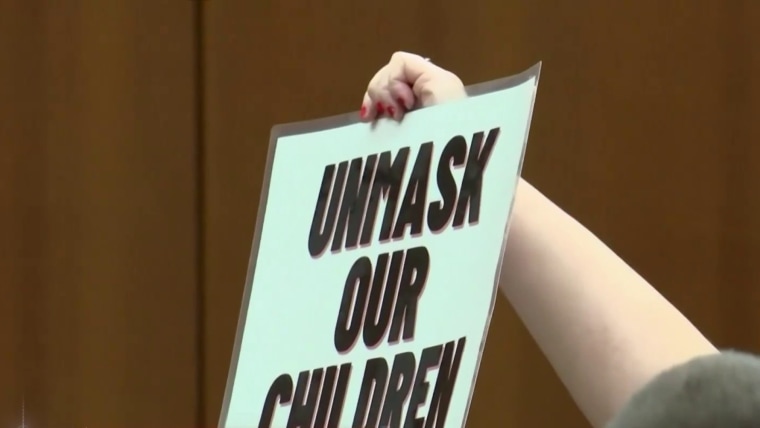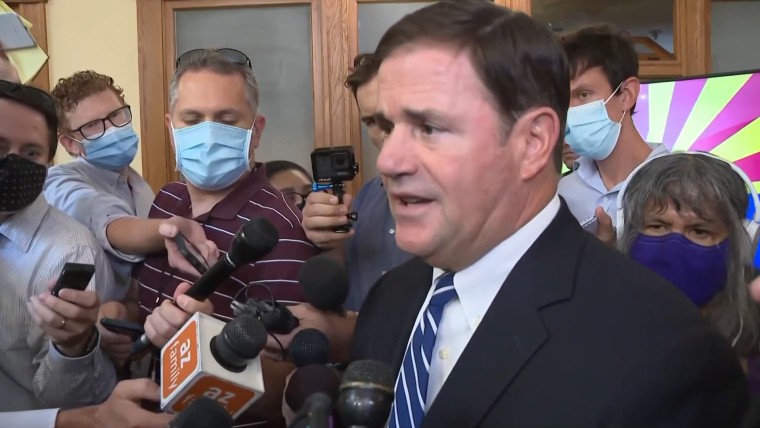A California elementary school teacher was hospitalized this week after allegedly being assaulted by a parent who was upset about the school’s mask mandate for children. The attack is part of a rising pattern of violence against educators by parents, anti-maskers, and far-right extremists targeting schools that champion critical race theory, transgender rights and other issues over the past several months.
The attack is part of a rising pattern of violence against educators by parents.
But with the school year getting underway across the country, it’s the war on masks currently igniting parent protesters, and in ways that are rapidly turning violent.
Anti-mask protesters and far-right extremists like the Proud Boys have shown up at school board meetings to protest mask and vaccine mandates, heckling and threatening masked people, accusing educators of child abuse, and calling on schools to “unmask the children.”
In Texas, repeated altercations between parents and teachers — including one in which a parent ripped off a teacher’s face mask — led to a superintendent’s letter to parents asking everyone to “be kind” and stop fighting “mask wars in our schools.” In a Colorado district, sheriff’s deputies were stationed outside schools on the first day of classes to ensure protests did not disrupt student learning.

In some ways, the violence we’ve seen outside schools reflects broader tensions rippling across the country. People are stressed, grieving, and on edge, as evidenced by spiking road rage incidents and a rise in mass shootings. Much of this anger has been directed at public officials.
Throughout the pandemic, health care workers in the U.S. and abroad have been harassed, spat on, bullied, and attacked. Local health authorities have faced constant intimidation and even death threats by community members angry that their freedoms are being limited.
Over a third of parents across the U.S. do not think schools should require unvaccinated students and staff to wear masks.
That aggression is mobilized in part by rampant disinformation, including false and unsubstantiated claims about masks that have been spread on social media by so-called mom influencers, anti-mask groups, and online bots. Meanwhile, far-right groups have worked to align themselves with anti-maskers around shared concerns about “medical freedom” and public health mandates, situating such policies as governmental overreach.
The science on masks is clear: wearing a mask helps prevent the spread of Covid-19 and protects individuals from infection. This is true for adults and it is true for children. Last month, the Centers for Disease Control and Prevention issued new guidance in light of the delta variant, recommending universal indoor masking for all students, teachers, staff and visitors to K-12 schools, regardless of vaccination status. This followed similar guidance by the American Association of Pediatrics, which recommends that all students age 2 and older wear face masks at school.

But while the national guidance is clear, local school districts are mostly left on their own to decide how to implement it. Only 11 states require masks in schools; five others prohibit them, with a sixth ban set to take effect next month in Arizona. In all other states, it’s up to local officials to decide where they stand.
And those decisions — like nearly everything about the Covid-19 pandemic — are highly politicized. Over a third of parents across the U.S. do not think schools should require unvaccinated students and staff to wear masks, seeing mandates as an infringement on their freedom and personal choices.
Rising infections from the delta variant may change the arc of parents’ protests in the coming weeks, especially as we see more pediatric hospitalizations and deaths alongside the effects of “long Covid-19” in a growing number of children. Local policies are evolving on the issue, too. Several school districts in states banning mask mandates have already created workarounds by making masks a required part of school dress codes.
There have always been parents who disagree with school district policies — from debates about curriculum, testing, lunch menus, and school dress codes. But the past few months of parent protests have taken a darker, more violent turn, as parents have been arrested, launched shouting matches, and engaged in other unruly and sometimes violent behavior at school board meetings across the country.
As the remainder of the nation’s schools open in the coming weeks, teachers and educators should be alert to the possibility of further violence and disruptions. And as protesting parents’ attention shifts to schools and classroom teachers, it is imperative that we protect and defend the educators who are now on the front lines.

